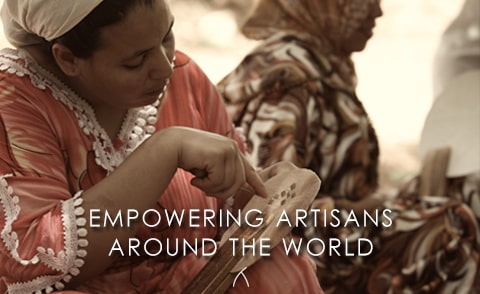A Memorable Journey to Organic Cotton Fields in India
Posted on 12 December 2016
In 2015 I left London to spend a year researching fashion on the ground in India. My journey had a simple purpose: To understand first-hand how our decisions in business impact the lives and ecosystems of those who make our clothes. Amongst other things, I studied cotton production on this trip. In fact, I visited organic cotton fields as well as conventional fields using chemicals for their crops. This story is one of many which had a profound effect on my view of the world. It also underlines why I wake up every day to do what I do.
Join me for a moment. We are in a very rural part of India, an area which is not necessarily landmarked on Google: It is called Desil.
Driving into Rural Parts of India
You are travelling along a narrow road. Speeding by, there are crops for as far as you can see. Then, there is red brown soil and vast fields that stretch out to the sky. It is hot and humid and men wearing brightly coloured lungis pulling oxen carts flash by. You are driving deep into one of the most tribal areas of India, one of the most remote, rural areas in the world. Few westerners have trod this path and there are strict guidelines and bureaucracy for entry: a pre-approved itinerary of every movement in order to even step out of the car.

Arrival in a Welcoming Village
Finally, the jeep pulls into a small slip road, there are paddy fields either side and it is far from evenly-grounded. Suddenly the road disappears entirely, ahead of us villagers are literally laying it down in front of our eyes. A few difficult manoeuvres and a very bumpy stretch later and we round a corner into the village. Then, a warm welcome awaits. The whole village has arrived with wreaths of coloured flowers, brightly coloured saris and smiles everywhere we look.

The Fatal Problems of Conventional Cotton
It is Chetna Organic's 10th Anniversary and we are here to ask a question asked by thousands half a world away: 'why does organic and fairly traded cotton actually matter?' Chetna Organic is an organisation working with small and marginal farmers in various regions of India with the aim of improving their livelihood options and at the same time making farming a sustainable and profitable occupation.
Many of us are already familiar with the harmful nature of conventional cotton as opposed to organic cotton. At the consumer level these chemicals can cause skin problems, sometimes headaches and dizziness.
At the farmer level, poor safety measures, misuse and toxicity of the chemicals can severely damage heath. Some causing cancers and even risking death. Growth of conventional cotton is astonishingly chemically intensive. Whilst it only occupies 2.4% of the world's farmland, it accounts for 16% of global insecticide use, more than any other single crop. In India, this figure begins to get pretty terrifying: 5% of the land under crops use 54% annual pesticides. The figures are staggering.

It is estimated that 99% of all workers in the cotton industry are from the developing world with little or no access to opportunity or education. The fall out of this is harrowing. In fact, across India's cotton belt, farmers have been known to regularly end their lives. This is due to issues such as debt, illness, crop failures and extreme poverty. They do this by drinking the harmful pesticides they spray on their land. As a result, they are leaving behind families with zero support from the government. It is estimated that up to 300,000 farmers have committed suicide in this manner since 1995 alone. We met a few who told us first-hand how they had considered suicide before being involved with the cooperative efforts of Chetna.
Encouraging Organic Cotton Farming
We exit the village to tour some organic cotton fields a short distance away. As we drive, our guide points out a farmer tending a conventional crop by spraying pesticides. He wears no face mask or any protective clothing and walks barefoot through his fields. A common sight according to our guide.

Chetna's impact on these communities has been important. As a matter of fact, they work with over 25,000 small and tribal farmers to date operating various self-help and community initiatives encouraging organic cotton crops. The organisation gives farmers opportunities to share skills and pool resources: they can create important reserves for shortfalls in crop yields; fund machinery to increase crop efficiency across the board; and build vital community resources to impact living standards, such as schools and sanitation.
An Eye-opening Journey
Thanks to increased awareness and availability, the use of organic and fairly traded cotton is gradually increasing. Thus, brands are beginning to switch out conventional cotton with organic and fair trade alternatives. At the same time, consumers are beginning to demand better standards of production. But we still have a long way to go with marginalised farmer stakeholders at the bottom of a very long, human intensive supply chain.
Finally, on the journey home from this trip, the answer to our question was crystal clear. The reality of it is by choosing to buy organic cotton wherever possible, you are helping to impact the lives of people on a monumental scale.

© All photos via Kate Osborne



0 comments